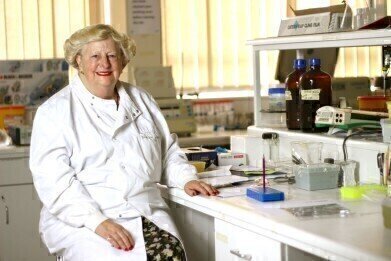-
 Professor Diana Anderson in the lab
Professor Diana Anderson in the lab
News
Potential Universal Blood Test for Cancer Discovered
Sep 02 2014
Researchers from the University of Bradford have devised a simple blood test that can be used to diagnose whether people have cancer or not. The test will enable doctors to rule out cancer in patients presenting with certain symptoms, saving time and preventing costly and unnecessary invasive procedures such as colonoscopies and biopsies being carried out. Alternatively, it could be a useful aid for investigating patients who are suspected of having a cancer that is currently hard to diagnose.
Early results have shown the method gives a high degree of accuracy diagnosing cancer and pre-cancerous conditions from the blood of patients with melanoma, colon cancer and lung cancer.* The Lymphocyte Genome Sensitivity (LGS) test looks at white blood cells and measures the damage caused to their DNA when subjected to different intensities of ultraviolet light (UVA), which is known to damage DNA. The results of the empirical study show a clear distinction between the damage to the white blood cells from patients with cancer, with pre-cancerous conditions and from healthy patients.
Professor Diana Anderson, from the University’s School of Life Sciences led the research. “These are early results completed on three different types of cancer and we accept that more research needs to be done; but these results so far are remarkable,” said Professor Anderson. "Whilst the numbers of people we tested are, in epidemiological terms, quite small, in molecular epidemiological terms, the results are powerful.
We’ve identified significant differences between the healthy volunteers, suspected cancer patients and confirmed cancer patients of mixed ages at a statistically significant level of P<0.001. This means that the possibility of these results happening by chance is 1 in 1000. We believe that this confirms the test’s potential as a diagnostic tool.”A clinical trial is currently underway at Bradford Royal Infirmary investigating the effectiveness of the LGS test in correctly predicting which patients referred by their GPs with suspected colorectal cancer would, or would not, benefit from a colonoscopy – currently the preferred investigation method.
The research is published online in FASEB Journal, the US journal of the Federation of American Societies for Experimental Biology.
Digital Edition
Lab Asia Dec 2025
December 2025
Chromatography Articles- Cutting-edge sample preparation tools help laboratories to stay ahead of the curveMass Spectrometry & Spectroscopy Articles- Unlocking the complexity of metabolomics: Pushi...
View all digital editions
Events
Jan 21 2026 Tokyo, Japan
Jan 28 2026 Tokyo, Japan
Jan 29 2026 New Delhi, India
Feb 07 2026 Boston, MA, USA
Asia Pharma Expo/Asia Lab Expo
Feb 12 2026 Dhaka, Bangladesh


















